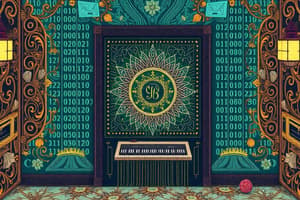Podcast
Questions and Answers
What was the primary component for computing devices in the early 20th century?
What was the primary component for computing devices in the early 20th century?
- Logic gates
- Mechanical relays
- Transistors
- Vacuum tubes (correct)
Who proposed the concept of an Arithmetic Logic Unit (ALU) in 1945?
Who proposed the concept of an Arithmetic Logic Unit (ALU) in 1945?
- Charles Xavier Thomas
- John von Neumann (correct)
- Blaise Pascal
- Paul Crayence
Which ancient civilizations used the abacus?
Which ancient civilizations used the abacus?
- Egyptians and Chinese
- Mesopotamians and Phoenicians
- Greeks and Romans (correct)
- Mayans and Aztecs
What is the primary function of the Arithmetic Logic Unit (ALU) in a CPU?
What is the primary function of the Arithmetic Logic Unit (ALU) in a CPU?
What has been the trend in word sizes for modern processors?
What has been the trend in word sizes for modern processors?
What replaced vacuum tubes in the late 1940s?
What replaced vacuum tubes in the late 1940s?
What is the primary function of an operating system?
What is the primary function of an operating system?
What was the primary purpose of early computers?
What was the primary purpose of early computers?
What is the role of programming languages in computing?
What is the role of programming languages in computing?
What was the impact of the personal computer revolution in the 1970s?
What was the impact of the personal computer revolution in the 1970s?
What is a concern associated with computers and their use of data?
What is a concern associated with computers and their use of data?
What is the significance of the invention of the first electronic digital computer in 1946?
What is the significance of the invention of the first electronic digital computer in 1946?
What is the main function of a computer?
What is the main function of a computer?
What enables digital computers to perform complex tasks?
What enables digital computers to perform complex tasks?
What is the primary role of computer hardware?
What is the primary role of computer hardware?
What is an example of an application of computers in modern society?
What is an example of an application of computers in modern society?
What is the significance of the term 'computer' in the past?
What is the significance of the term 'computer' in the past?
What is a component of a computer that is responsible for processing data?
What is a component of a computer that is responsible for processing data?
Study Notes
Introduction to Computers
Early Computing
Computing began with the invention of the abacus, a counting tool that dates back to ancient civilizations such as the Greeks and Romans. These early counting devices were replaced by mechanical calculators in the 17th century, like the Pascaline, developed by Blaise Pascal. In the 19th century, Charles Xavier Thomas and Paul Crayence created the first programmable electronic calculator, the Analytical Engine.
Vacuum Tubes and Logic Gates
In the early 20th century, vacuum tubes replaced mechanical relays and became the primary component for computing devices. Vacuum tubes were small glass tubes that amplified and acted as switches, facilitating the flow of electrons. However, they were large, power-hungry, and prone to failure, leading to the development of transistors in the late 1940s.
Transistors and the Birth of the CPU
Transistors revolutionized computing by allowing for smaller, more efficient, and more reliable electronic devices. In 1945, John von Neumann proposed the concept of an Arithmetic Logic Unit (ALU), which is an integral part of the CPU, even in simple processors. The ALU performs arithmetic operations and logical operations on data stored in the computer's memory.
Word Size and Cache
Modern processors use different word sizes to process data. Initially, PC processors had word sizes of 16 bits, later increasing to 32 bits, and now 64 bits. Word size determines how quickly data can be transferred within each microprocessor. To further improve performance, cache memory was developed. Level 2 cache is external cache that has more memory, ranging from 64 kB to 2 MB. Level 3 cache is also external but is only used in high-end computers. Processors with higher cache sizes are faster but also more expensive.
Moore's Law and Future of Computing
Moore's Law, named after Gordon Moore, predicts the number of transistors on a microchip will double approximately every two years. This rate of progress has held true since the mid-20th century, but it has slowed somewhat in recent years. Despite this, advancements in computing continue, driven by the need for more efficient processors and smaller, cheaper devices.
Studying That Suits You
Use AI to generate personalized quizzes and flashcards to suit your learning preferences.
Description
Introduction objectives, computer and latest IT gadgets, computers and its applications, IT gadgets and their applications, basics of hardware and software, hardware, central processing unit, input devices, output devices ,computer memory and storage, connecting keyboard ,mouse, monitor and printer to CPU, software, application software ,system software, mobile apps




